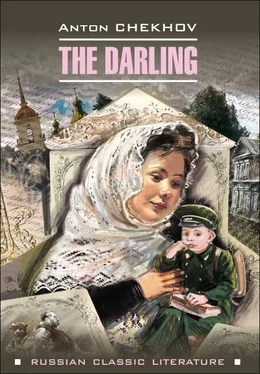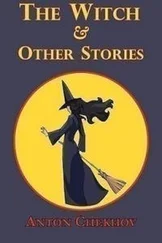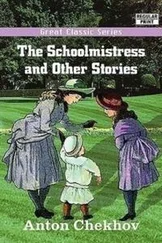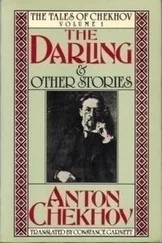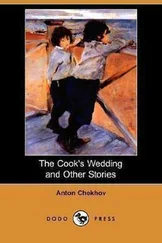Антон Чехов - The darling / Душечка. Сборник рассказов
Здесь есть возможность читать онлайн «Антон Чехов - The darling / Душечка. Сборник рассказов» — ознакомительный отрывок электронной книги совершенно бесплатно, а после прочтения отрывка купить полную версию. В некоторых случаях можно слушать аудио, скачать через торрент в формате fb2 и присутствует краткое содержание. Год выпуска: 2019, ISBN: 2019, Издательство: Литагент Каро, Жанр: Классическая проза, Русская классическая проза, Прочая научная литература, на английском языке. Описание произведения, (предисловие) а так же отзывы посетителей доступны на портале библиотеки ЛибКат.
- Название:The darling / Душечка. Сборник рассказов
- Автор:
- Издательство:Литагент Каро
- Жанр:
- Год:2019
- ISBN:978-5-9925-1149-9
- Рейтинг книги:5 / 5. Голосов: 1
-
Избранное:Добавить в избранное
- Отзывы:
-
Ваша оценка:
- 100
- 1
- 2
- 3
- 4
- 5
The darling / Душечка. Сборник рассказов: краткое содержание, описание и аннотация
Предлагаем к чтению аннотацию, описание, краткое содержание или предисловие (зависит от того, что написал сам автор книги «The darling / Душечка. Сборник рассказов»). Если вы не нашли необходимую информацию о книге — напишите в комментариях, мы постараемся отыскать её.
The darling / Душечка. Сборник рассказов — читать онлайн ознакомительный отрывок
Ниже представлен текст книги, разбитый по страницам. Система сохранения места последней прочитанной страницы, позволяет с удобством читать онлайн бесплатно книгу «The darling / Душечка. Сборник рассказов», без необходимости каждый раз заново искать на чём Вы остановились. Поставьте закладку, и сможете в любой момент перейти на страницу, на которой закончили чтение.
Интервал:
Закладка:
“I cannot marry.”
“Why not?” Katya asked softly.
“Because for a painter, and in fact any man who lives for art, marriage is out of the question. An artist must be free.”
“But in what way should I hinder you, Yegor Savvitch?”
“I am not speaking of myself, I am speaking in general … Famous authors and painters have never married.”
“And you, too, will be famous – I understand that perfectly. But put yourself in my place. I am afraid of my mother. She is stern and irritable. When she knows that you won’t marry me, and that it’s all nothing … she’ll begin to give it to me. Oh, how wretched I am! And you haven’t paid for your rooms, either! …”
“Damn her! I’ll pay.”
Yegor Savvitch got up and began walking to and fro.
“I ought to be abroad!” he said. And the artist told her that nothing was easier than to go abroad. One need do nothing but paint a picture and sell it.
“Of course!” Katya assented. “Why haven’t you painted one in the summer?”
“Do you suppose I can work in a barn like this?” the artist said ill-humouredly. “And where should I get models?”
Some one banged the door viciously in the storey below. Katya, who was expecting her mother’s return any minute, jumped up and ran away. The artist was left alone. For a long time he walked to and fro, threading his way between the chairs and the piles of untidy objects of all sorts. He heard the widow rattling the crockery and loudly abusing the peasants who had asked her two roubles for each cart. In his disgust Yegor Savvitch stopped before the cupboard and stared for a long while, frowning at the decanter of vodka.
“Ah, blast you!” he heard the widow railing at Katya. “Damnation on you!”
The artist drank a glass of vodka, and the dark cloud in his soul gradually disappeared, and he felt as though all his inside was smiling within him. He began dreaming … His fancy pictured how he would become great. He could not imagine his future works but he could see distinctly how the papers would talk of him, how the shops would sell his photographs, with what envy his friends would look at him. He tried to picture himself in a magnificent drawing-room surrounded by pretty and adoring women; but the picture was misty, vague, as he had never in his life seen a drawing-room. The pretty and adoring women were not a success either, for except Katya, he knew no adoring woman, not even one respectable girl. People who know nothing about life usually picture life from books, but Yegor Savvitch knew no books either. He had tried to read Gogol 36 36 Gogol – (1809–1852), a Russian novelist, short-story writer
, but had fallen asleep on the second page.
“It won’t burn, drat the thing!” the widow bawled down below, as she set the samovar . “Katya, give me some charcoal!”
The dreamy artist felt a longing to share his hopes and dreams with some one. He went downstairs into the kitchen, where the stout widow and Katya were busy about a dirty stove in the midst of charcoal fumes from the samovar . There he sat down on a bench close to a big pot and began:
“It’s a fine thing to be an artist! I can go just where I like, do what I like. One does not have to work in an office or in the fields. I’ve no superiors or officers over me … I’m my own superior. And with all that I’m doing good to humanity!”
And after dinner he composed himself for a “rest.” He usually slept till the twilight. But this time soon after dinner he felt that some one was pulling at his leg. Some one kept laughing and shouting his name. He opened his eyes and saw his friend Ukleikin, the landscape painter, who had been away all the summer in the Kostroma district.
“Bah!” he cried, delighted. “What do I see?”
Handshakes and questions followed
“Well, have you brought anything? I suppose you’ve knocked off hundreds of sketches?” said Yegor Savvitch, watching Ukleikin taking his belongings out of his trunk.
“H’m! … Yes. I have done something. And how are you getting on? Have you been painting anything?”
Yegor Savvitch dived behind the bed, and crimson in the face, extracted a canvas in a frame covered with dust and spider webs.
“See here … A girl at the window after parting from her betrothed. In three sittings. Not nearly finished yet.”
The picture represented Katya faintly outlined sitting at an open window, from which a garden and lilac distance could be seen. Ukleikin did not like the picture.
“H’m! … There is air and … and there is expression,” he said. “There’s a feeling of distance, but … but that bush is screaming … screaming horribly!”
The decanter was brought on to the scene.
Towards evening Kostyliov, also a promising beginner, an historical painter, came in to see Yegor Savvitch. He was a friend staying at the next door villa, and was a man of five-and-thirty. He had long hair, and wore a blouse with a Shakespeare collar, and had a dignified manner. Seeing the vodka, he frowned, complained of his chest, but yielding to his friends’ entreaties, drank a glass.
“I’ve thought of a subject, my friends,” he began, getting drunk. “I want to paint some new … Herod or Clepentian, or some blackguard of that description, you understand, and to contrast with him the idea of Christianity. On the one side Rome, you understand, and on the other Christianity … I want to represent the spirit, you understand? The spirit!”
And the widow downstairs shouted continually:
“Katya, give me the cucumbers! Go to Sidorov’s and get some kvass , you silly girl!”
Like wolves in a cage, the three friends kept pacing to and fro from one wall of the room to the other. They talked without ceasing, talked hotly and genuinely; all three were excited, carried away. To listen to them it would seem they had the future, fame, money in their hands. And it never occurred to either of them that time was passing, that every day life was nearing its close, that they had lived at other people’s expense and nothing yet was accomplished; that they were all bound by the inexorable law by which of a hundred promising beginners only two or three rise to any position and all the others draw blanks in the lottery, perish playing the part of cannon fodder … They were gay and happy, and looked the future boldly in the face!
At one o’clock in the morning Kostyliov said goodbye, and smoothing out his Shakespeare collar, went home. The landscape painter remained to sleep at Yegor Savvitch’s. Before going to bed, Yegor Savvitch took a candle and made his way into the kitchen to get a drink of water. In the dark, narrow passage Katya was sitting on a box, and, with her hands clasped on her knees, was looking upwards. A blissful smile was straying on her pale, exhausted face, and her eyes were sparkling.
“Is that you? What are you thinking about?” Yegor Savvitch asked her.
“I am thinking of how you’ll be famous,” she said in a half-whisper. “I keep fancying how you’ll become a famous man … I overheard all your talk … I keep dreaming and dreaming …”
Katya went off into a happy laugh, cried, and laid her hands reverently on her idol’s shoulders.
AN ARTIST’S STORY
I
It was six or seven years ago when I was living in one of the districts of the province of T – —, on the estate of a young landowner called Byelokurov, who used to get up very early, wear a peasant tunic, drink beer in the evenings, and continually complain to me that he never met sympathy from any one. He lived in the lodge in the garden, and I in the old seigniorial house, in a big room with columns, where there was no furniture except a wide sofa on which I used to sleep, and a table on which I used to lay out patience. There was always, even in still weather, a droning noise in the old Amos stoves, and in thunder-storms the whole house shook and seemed to be cracking into pieces; and it was rather terrifying, especially at night, when all the ten big windows were suddenly lit up by lightning.
Читать дальшеИнтервал:
Закладка:
Похожие книги на «The darling / Душечка. Сборник рассказов»
Представляем Вашему вниманию похожие книги на «The darling / Душечка. Сборник рассказов» списком для выбора. Мы отобрали схожую по названию и смыслу литературу в надежде предоставить читателям больше вариантов отыскать новые, интересные, ещё непрочитанные произведения.
Обсуждение, отзывы о книге «The darling / Душечка. Сборник рассказов» и просто собственные мнения читателей. Оставьте ваши комментарии, напишите, что Вы думаете о произведении, его смысле или главных героях. Укажите что конкретно понравилось, а что нет, и почему Вы так считаете.
